Freelance Writing: From Beginner to In-Demand Freelance Writer
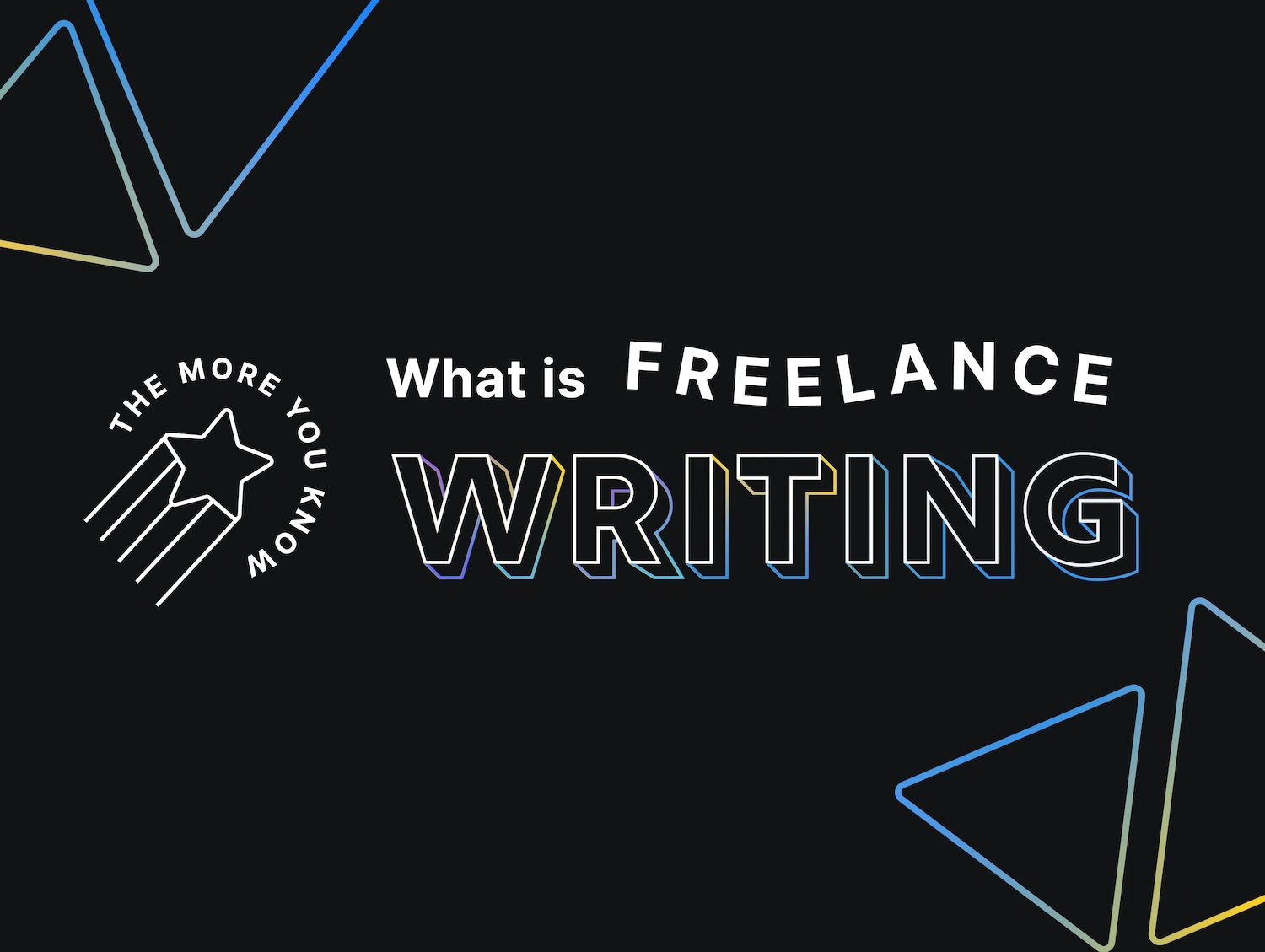
So you want to become a freelance writer? Maybe writing has been your passion, and you want to earn an income from it. Or you want to make some money writing part-time because you desire to work more independently.
Regardless, if you want to become independent, whether via moonlighting, freelancing, or simply working on side projects, freelance writing is a great industry to enter. With 33% of freelancers working in creative fields, there are plenty of opportunities for revenue generation.
For many, going independent also means freedom from corporate burnout and micromanaging oversight. Yes, that means no more scheduled 10-minute breaks or five-sick-days-a-year mandates.
Independent work brings freedom in more ways than one. But it’s also challenging. There’s a learning curve, and staying motivated to achieve your goals requires hard work and dedication.
To help you with your journey to independence, I will introduce you to some steps you can take to go from beginner to successful independent writer.
This article will discuss:
The types of freelance writing
How to create an online freelance writing profile
How much to charge for your freelance writing
Where to find clients and freelance writing jobs
3 tips to landing projects from referrals
Freelance writing tools for payments, organization, and productivity
Let’s dive in!
What is Freelance Writing? Am I Qualified to Become a Freelance Writer?
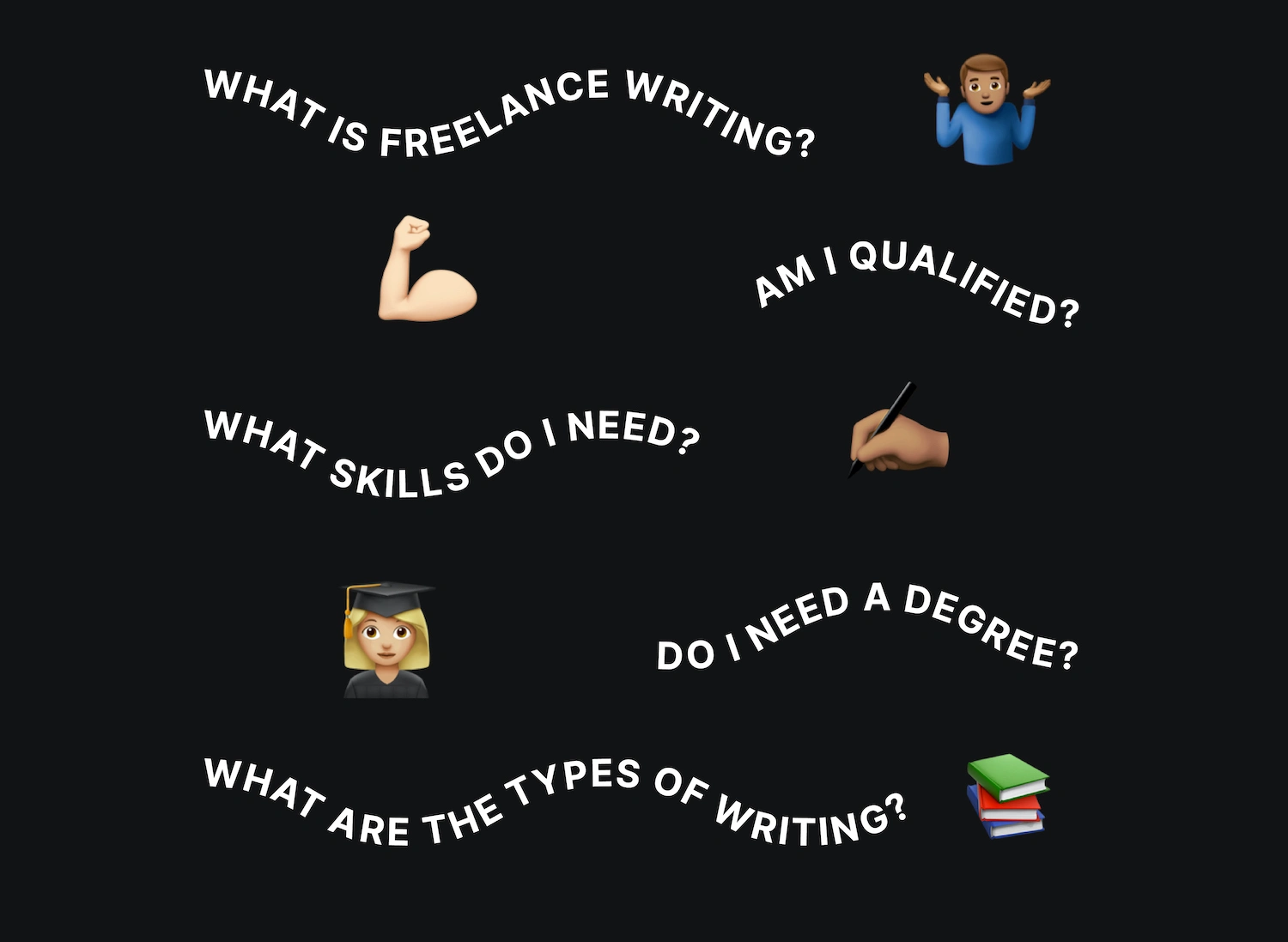
Freelance writers provide writing services for businesses of all kinds. They do not work as employees for a company, but instead work independently as independent business owners.
Freedom of schedule is one of the biggest pros to working independently. That and doing whatever you want, whenever you want. As a freelance writer, you can work for one or multiple clients as your time allows. Your time is yours, and you can do with it whatever you wish.
Write at your favorite local cafe right before you meet your friend for lunch...
Work at your favorite coworking space…
Travel abroad and take your writing work with you…(Write in Rome today, shop in Paris tomorrow)
And since independents are digitally connected, you can also work with clients and businesses anywhere in the world, from wherever you are.
But hold up, I can hear you asking...
How Much Experience Do I Need? Do I Need a Degree?
I’d be lying to you if I said that your freelance writing journey would not come with its pitfalls and challenges. I’ve had multiple breakdowns and cried on my husband’s lap for hours after making a stupid mistake with a client (don’t ask).
But this has nothing to do with your background. I don't have an English degree (I have a bachelor’s in Biology. Crazy, right?), yet I have excelled as a freelance writer for more than a decade, specializing in digital marketing topics.
You don’t need a degree or any experience working with clients to break into freelance writing. But (and that’s a big BUT), you do need to write well. Basic grammar and word usage, sentence flow, and writing mechanics are essential.
Am I good enough to earn money as a freelance writer? If you are unsure, connect with an editor and get some feedback on your writing. The skilled editors I have worked with over the years have been invaluable to me and helped me improve.
I also recommend learning more skills than just writing.
The freelance writing industry has changed in the last decade. Technology moves fast and has placed a demand on writers to dabble in multiple disciplines. Businesses desire more skills than just writing. They like to work with online writers who have some expertise in:
How graphics enhance content
SEO (search engine optimization)
Optimizing content for the search engines.
How to write conversational copy (to keep readers’ interest and combat zero attention spans)
How to write copy that converts (some copywriting skills)
Side note: Whenever I hire bloggers, I always look for basic copywriting skills because copywriters learn how to speak directly to their audience, which keeps readers engaged.
Types of Freelance Writing
There are many different kinds of writing, but for the sake of brevity, we will cover online writing in this article since it is such a large industry and the easiest to break into.
A few other writing industries are:
Print media (magazines, journals)
Ghostwriting and book writing
Instructional, educational, or curriculum writing
Online writing encompasses writing digital content for businesses. The reason online writing is so lucrative is that most companies have an online presence, and they need a regular supply of fresh content such as:
Blogs (long-form, short-form, ultimate guides)
Press releases
Email newsletters
Social content
Copywriting (Landing pages, website content, emails, etc.)
Product descriptions
Articles on external media publications
Product descriptions
Ebooks
Video scripts
Specialized reports
Whitepapers
Case studies
Business/financial plans
If you want to learn more about choosing your type of writing and specialty and the pros and cons of freelance writing, read my recent article on how to get started as a freelance writer. It will help you start your freelance writing journey on the proper foundation and set you up for success.
How to Create a Freelance Writing Profile: Your Professional Identity
Before you start marketing yourself to potential clients and applying for online writing jobs, you need an online profile to showcase your work and services. Prospects will want to see that you have the writing chops they want.
Don’t have any writing samples? No worries. If you are brand new with no experience working with clients, here are some ideas to get you started:
Work samples - Did you write anything noteworthy at your job? For example, if you are a CPA who wants to write about accounting and you have previous pieces you wrote for your past firms, use those as samples. If you think about past writing activities, you may be surprised what you come up with.
School samples - Did you write for the school paper? Work on school projects in your community?
Start a blog and fill it with a few samples. Trust me; you don’t need a lot. Just enough to showcase your expertise. I’ve got one blog post on my blog, but I still use it as a sample.
Work with family members or friends who have businesses
Contribute guest blog posts on media sites
Write for a local newspaper
Create the writing samples yourself and post them directly on your online profile (we will discuss how to create a profile in the next section)
Collaborate with other independents on a new project. Check out online platforms focused on empowering today’s independent creative workforce, like Contra. If you are just starting as a freelance writer, add projects you worked on in school and invite your team members to join Contra so they can be added to your project. Even if you created a project for fun, add it to your profile to round out your professional identity.
Note that your writing samples should match the industry you want to enter. For example, if you want to break into the business financial sector, create samples around topics businesses in that industry would be interested in publishing (building a business financial plan, etc.). Don’t write about how you trained your dog Pooky if you want to break into IT resume writing, OK?
Set Up Your Online Identity
Your online profile is your digital identity. It showcases your skills and the work you are proud of. Potential clients can view your online profile, your samples, and projects to discover more about your work and your services.
Setting up your online identity is easy with the right tools. Many online tools allow writers to set up profile pages and upload resumes. But not all cater to the independent who seeks to express their identity while collaborating with trusted, like-minded professionals. This is one of the secrets to a lasting freelance writing career.
Enter Contra.
Contra is the first professional community for the independent digital workforce. It defines a new way to work flexibly and collaboratively.
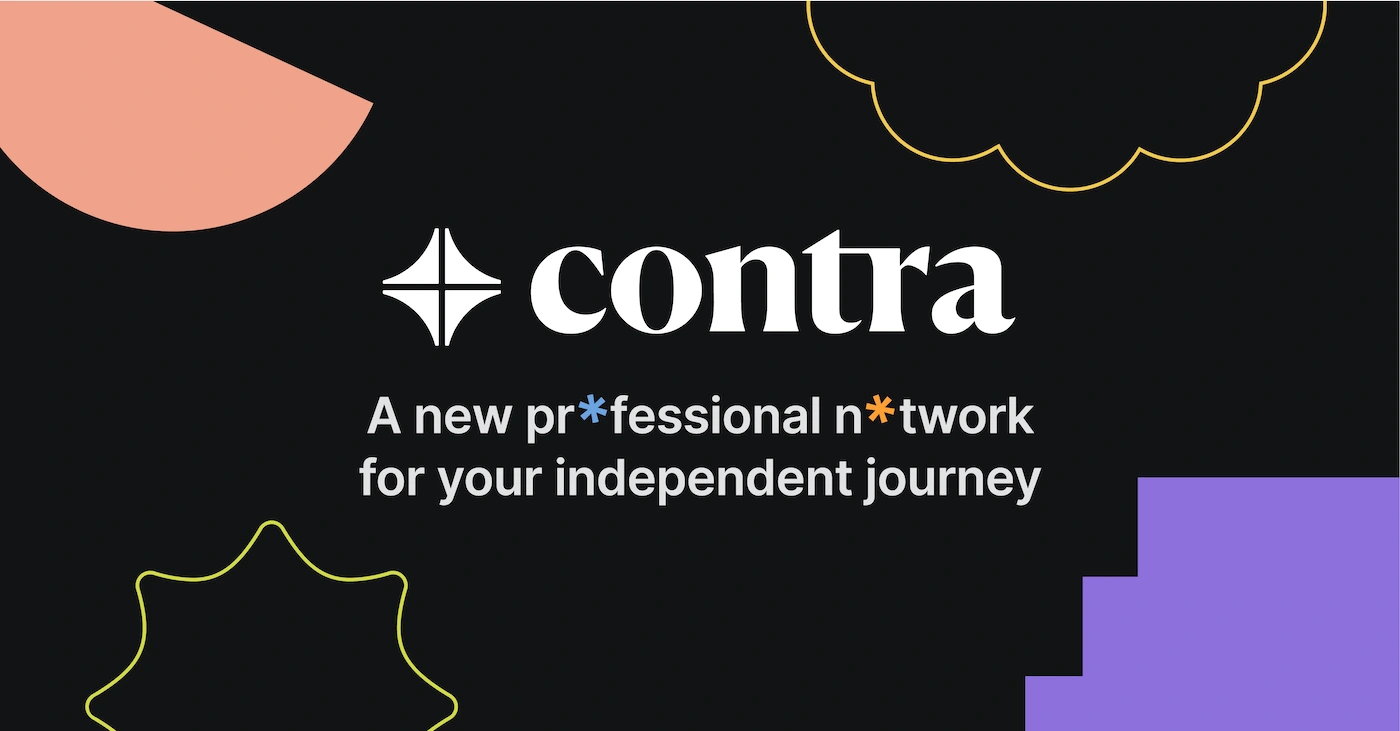
Contra is a unique platform because it focuses less on your resume and more on your skills and work. Your work speaks volumes, and it compels potential clients to focus on what you can do for them instead of your work background, which may or may not have any connection to your current skill set and prowess.
Build your professional identity on Contra by showcasing the projects you and others completed. Add collaborators to projects to build your network and reputation, attracting referrals from ongoing clients.
In addition, Contra offers job and referral opportunities, educational resources, facilitates client payments, contracts, and communication, and gives you the ability to join a tight-knit community — all without charging commission fees on client payments.
Contra is an all-in-one platform for independent workers, whether you are moonlighting or freelancing full-time.
Contra features:
Build a trusted independent network
Access educational resources
Find referrals
Find high-quality job opportunities
Zero commission fees
Accept payments from clients
Communicate directly with prospects
Showcase your current skills and projects
Create a professional online identity
With Contra, you can stop working to make a living and instead work to make a difference. And this is what we want, right?
Creating a profile on Contra is simple. The platform walks you through adding relevant information such as your headline, services, header image, profile picture, and most importantly, your projects.
Ensure your headline adequately and concisely describes the services you provide and your skills. There is no need to overwhelm the title with keywords because Contra allows you to add your skills that show up directly under your headline (which is great for potential clients to see).
You can also create a professional header image easily with tools like Canva. I created this header image in about 30 seconds with a free Canva template.
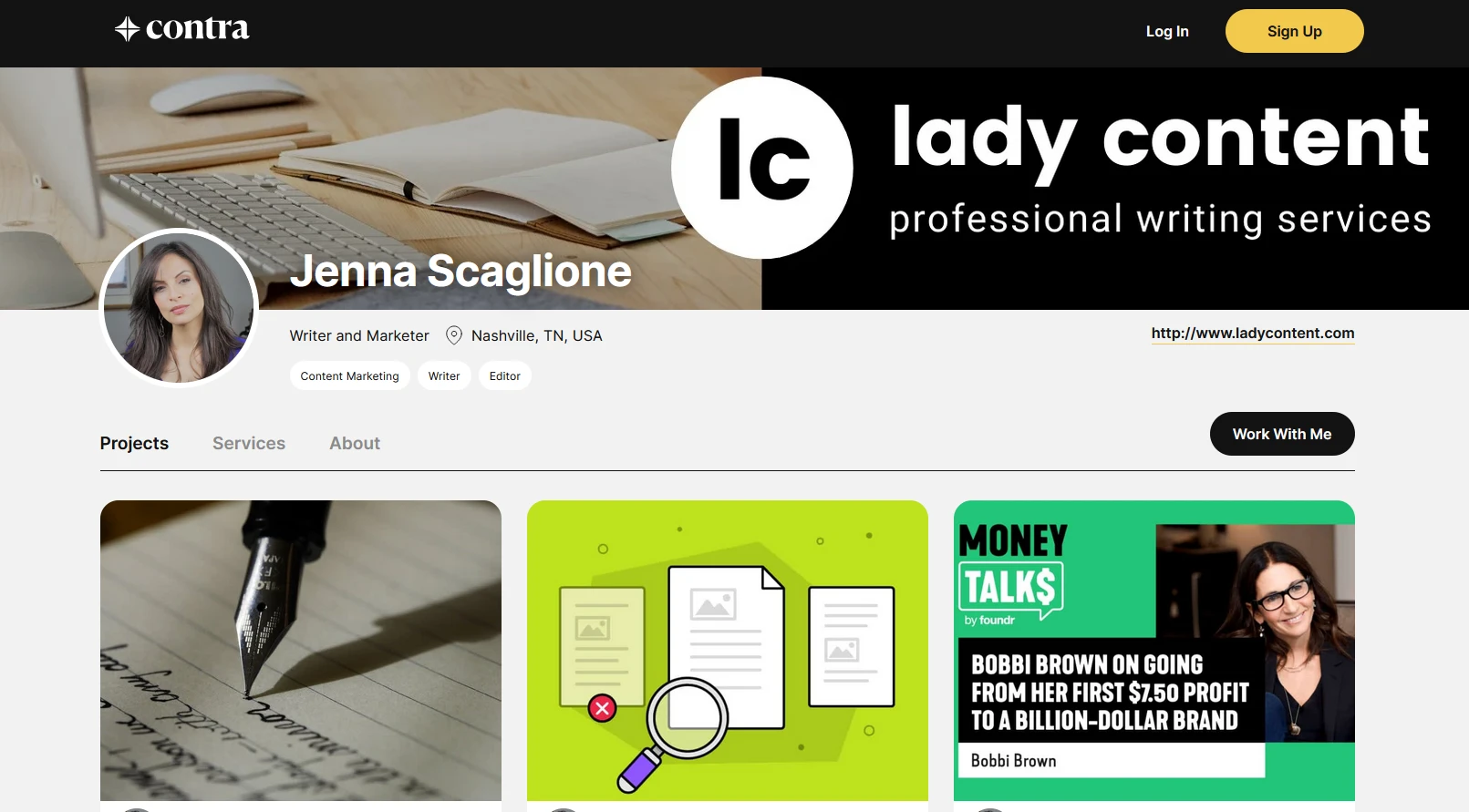
For more detailed information on creating a compelling professional identity on Contra, read this in-depth article on how to build a writer portfolio website.
Also, check out these helpful tips and tutorials on how to build out your professional identity and get the most out of Contra.
How Much Should I Charge for my Freelance Writing?
If I had a dollar for every time an independent writer asked me this question, I’d be a gazillionaire. Or at least one of the best exaggerators in history.
Independents get stuck between fear of charging too much that they turn away clients and charging too little that they undervalue their services.
This is why the “What do I charge?” question is the top one freelance writers ask when they start independent work.
It’s also the hardest one to answer because there are so many variables to consider. But, I’ll do my best to help you come closer to numbers that work for you. I’ve even got a formula to help you calculate an hourly rate (I guess my Biology degree actually came in handy for something).
First things first…
You might not need to offer clients your rates unless you are getting referrals and submitting quotes. If you apply for freelance writing jobs, clients will likely already have a fixed budget. This doesn’t mean that there won't be room for negotiation, but job rates are often fixed.
If you get a client referral or a prospect messages you for your rates, you have more freedom to charge what you want. But, even if you look for freelance writing jobs, you should still have an idea of what your writing services are worth.
Below is some information on how to charge for your freelance writing work.
There is no set or average pricing by which to compare your rates. Freelance writing rates are all over the place.
Writers might charge $5 an article up to $5,000 depending on the piece’s breadth, the writer’s experience, type of client, and other factors. Some writers just aren’t confident enough to charge more than they think they are worth, and other writers charge more than they think they are worth.
I started my independent career charging $8 an article (don’t ever do this). But I didn't know what I was doing. I now charge into the hundreds and even thousands depending on the piece, but I could have charged more sooner if I understood how the industry works. Hopefully, I can slash the learning curve for you.
Setting freelance writing rates is value-based and also personal, so there will always be some ambiguity. But your rates shouldn’t be a random number you come up with. There is some science behind what you charge.
The easiest way to think about freelance writing rates is to answer the following three questions:
1. Does the Rate Keep You Motivated to Do Your Best Work?
If you aren’t motivated to get out of bed in the morning and do your best work, you are probably not charging enough. Ain’t no one getting up out of bed for $5 and a nod from a client. It doesn’t matter how motivated you are as a person.
Now that doesn’t mean you should charge $10,000 for a 100-word article. Your rates should be competitive for your experience and skills and reward you for your hard work. We will talk about industry rates later in this section.
2. Does the Rate Help You Achieve Your Income Goals?
What are your income goals? If your rates do not help you achieve your goals, you will not be motivated to work.
Come up with a yearly revenue goal for your independent work. Depending on your projected work hours, calculate how much per hour you would charge to reach your annual income goals.
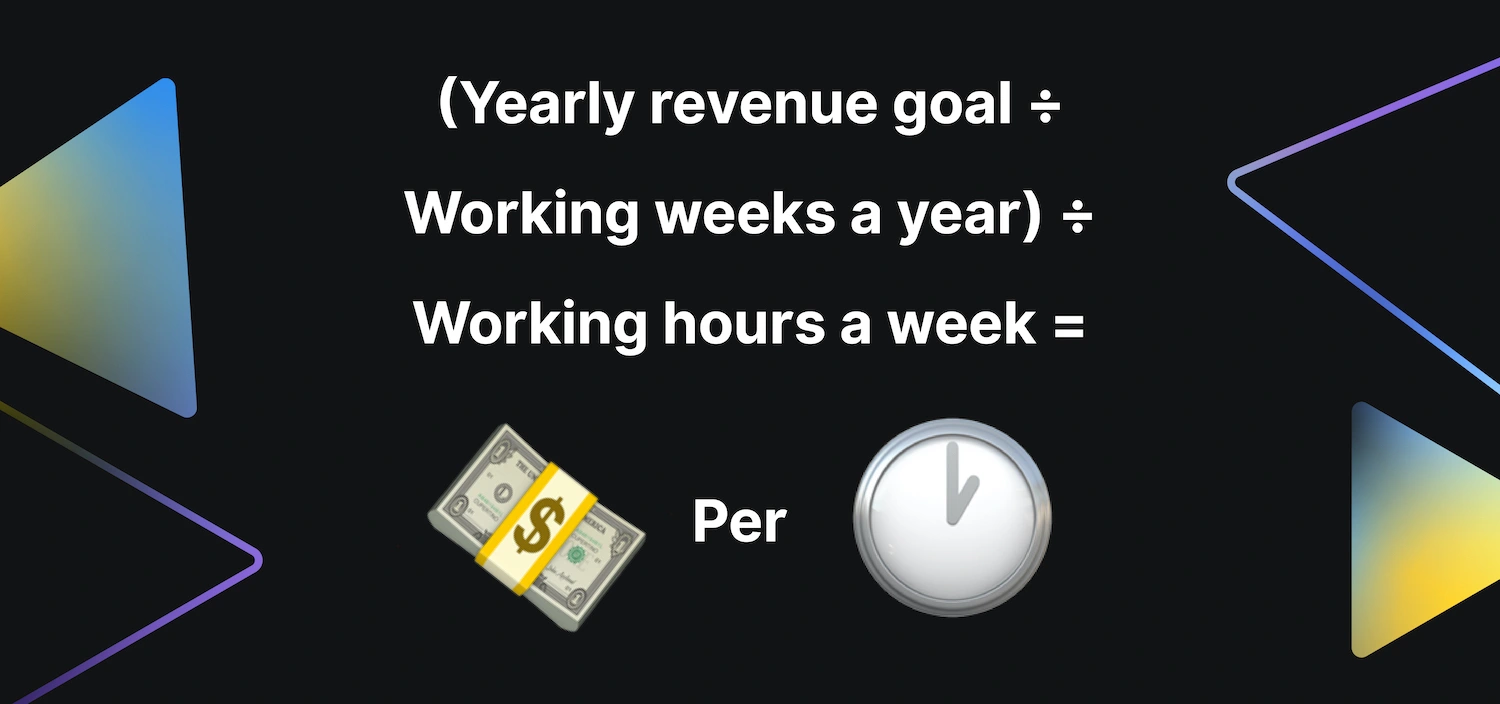
Example:
Let’s say you want to make $50,000 a year for full-time freelance writing work.
Typically, you would start with a 40-hour workweek, but you are no longer an employee and do not get paid for sick and vacation time. You now have to factor in vacations, sick time, and the hours you will spend on non-writing tasks such as client communication, marketing, invoicing, etc.
1. First, estimate your sick and vacation days for the year. Typically freelancers put aside 4-6 weeks a year. Let’s put aside four weeks for the sake of this example.
2. Subtract that number from 52 weeks a year. So if you estimate four weeks a year for sick and vacation time, you are left with 48 working weeks a year (52-48).
3. Next, estimate how many hours a week you will dedicate to just writing. If it is too difficult to calculate your writing hours because you are just starting, estimate 20 hours of actual writing time each week (about half of 40) for a full-time 40-hour workweek. Yes, you will spend a lot of time on non-writing work (invoicing, communication, job search, collaboration).
Here is how to calculate your desired rate per hour based on your revenue goal:
Yearly revenue goal = $50,000
Working weeks a year (Minus vacation and sick) = 48
Writing hours per week (Minus non-writing hours) = 20
(Yearly revenue goal / Working weeks a year) / Working hours a week = $ / hour
($50,000 / 48) / 20 writing hours a week = $52 / hour
RESULT → This calculation states that you will need to charge $52 / hour to earn $50K a year if you write for 20 hours a week and take four weeks off for sick and vacation time.
Now, this doesn’t mean that you will always charge your clients per hour. Typically, freelance writers prefer to charge by the project or per word. The reason is that it’s hard for the client to predict how much they will spend if you charge per hour. Plus, as the writer, you might write faster than average, and charging per project might yield a higher return.
When charging per project, estimate how many hours a project would take to complete, and then add a little more time as a buffer.
So if a client asks for your rate to write an eight-page ebook, you might estimate 20 hours, which is $52 x 20 = $1,040. Now, add on another three to five hours as a buffer. So 25 hours x $52 = $1,300.
Why a buffer? Well, aside from the dog eating your paper, a decade of experience has taught me that something always comes up that prolongs your project.
The client is a yapper and likes to talk
You want to add something extra in the ebook to really impress
You underestimated how long the project would take you (this happens ALL the time)
Your mother’s friend’s sister’s son just came into town, and your mother guilted you into showing him around town (you can’t say no to your mother)
TIP: If you charge per word, which I often do, be sure to estimate how many words the client can expect so they can budget accordingly. Stick to that word count when you write. If you go over, you may need to eat those costs unless you discussed overages with the client beforehand.
Moral of the story? When you start, go with a per-project rate, so both parties know what to expect before the project even begins.
Note that if your independent work involves attending ongoing meetings and events, charging per hour may be the way to go.
3. Does the Rate Match the Value You Want to Offer Your Clients?
Your clients will only be focusing on one thing: how much your content will help grow their business and achieve their business goals. They also won’t want to pay more than industry standards.
Actually, I lied. Some clients truly value the work you do and will pay above market value. But, this isn’t always the case, so you need to prepare for every client type.
Review Industry Averages
The first step to determining your value is to review industry averages for your line of work (aka what your clients might expect to pay). What is the market value for your specific service?
Use a salary database like PayScale to get information on industry averages.
Check Fellow Freelance Writers’ Rates
Don’t get too stuck on sites like Payscale, though. Based on a 2018 ClearVoice survey of 500+ writers, the largest percentage of Intermediate-level writers charge $41-$60 per hour.
In full transparency, I charge $75-$100+ per hour depending on the project, and I’ve been writing professionally for about 12 years. However, I might not turn down a $50/hour project if it could build my profile and challenge me to learn something new.
Review some freelance writer’s profiles to check out their rates. Many independent workers hide their rates, but some publish them on their websites and profiles. Research a few writers who write in your industry and scope out their rates to get an idea of the market.
Freelance Associations
The Editorial Freelance’s Association also published this rate card for writers and editors.
Factor in Your Experience
Your experience will also come into play here. If you have ample experience, charge what you are worth.
Don’t discount experience outside of writing as well. If you worked as an accountant for 10 years, but you just started writing in this industry, you are likely an expert in the topic, so your rates should follow suit. Factor in ALL experience when figuring out your rates.
Factor in the Value
If you are quoting for a project that will yield a quick return (sales page for a product launch, sales email), estimate how much revenue the content could generate and charge 10% of that number. So if the client expects to earn $100,000 from a launch, estimate about $10,000 for launch copy and content if it fits.
Trust me, it gets easier...
As you research writing rates, you will find that they are all over the place. But as you progress as a writer, you will get more acquainted with the workload and assess ideal rates better. For example, instead of 20, you might only spend 10 hours a week on non-writing work, which gives you more time to earn with writing. Start with a rate you feel comfortable with that helps you meet your income goals and adjust as you go.
How to Get Freelance Writing Jobs and Clients
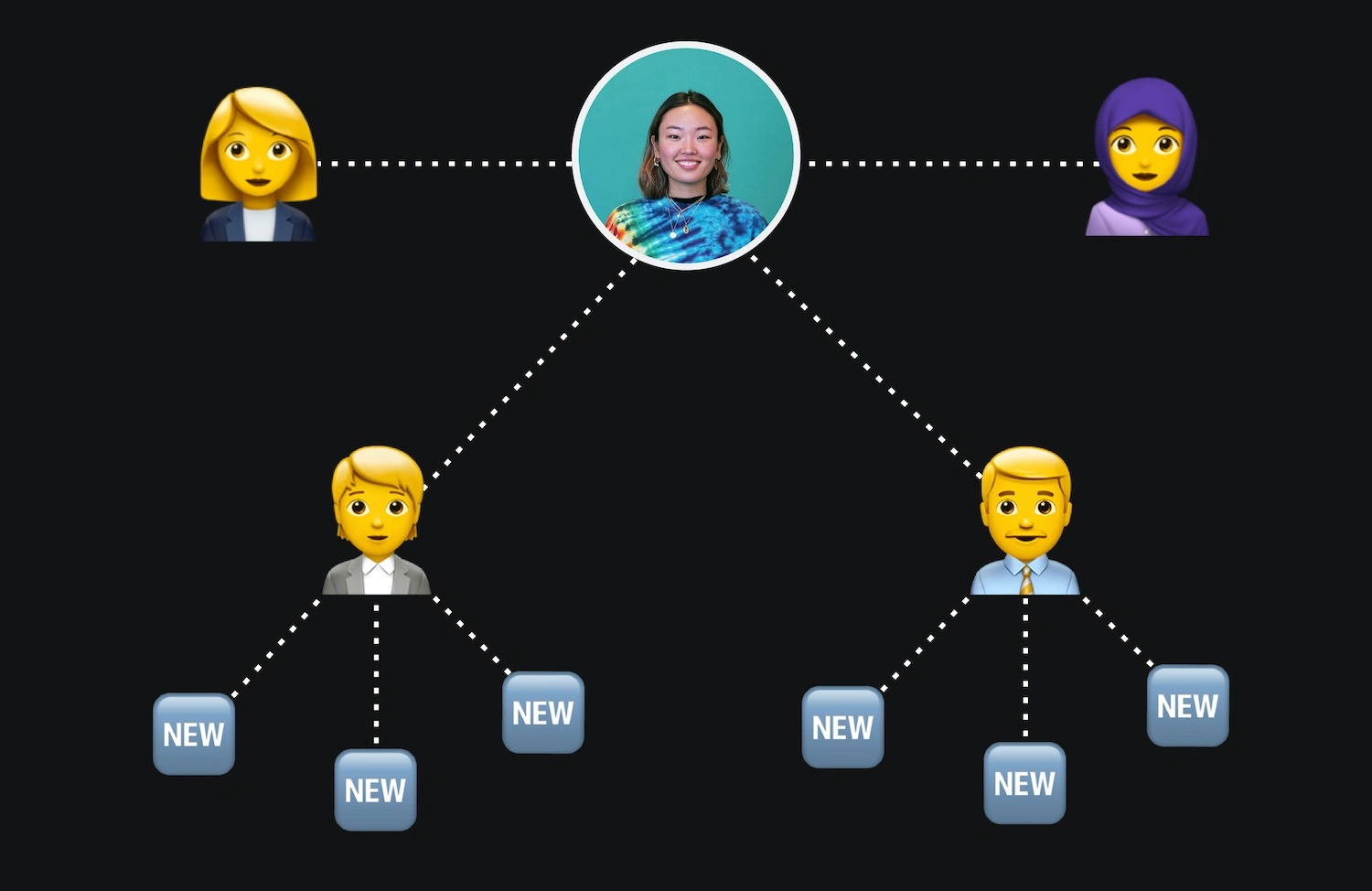
You set up your online profile with target samples and projects, and you know how much you want to charge, congrats! Now it’s time to find clients who will pay you for your work.
As mentioned in a previous section, you can either find freelance writing jobs or have clients come to you for work (or both). Setting yourself up to attract new clients means marketing yourself more heavily and getting ongoing referrals (see below).
Below are some ways to get new clients:
Your Current or Former Job
If you’re on good terms with your previous employers, ask them if they could benefit from any writing work. If your boss begs you to stay after you give your resignation, open a conversation about offering writing or consulting services independently.
Your Personal or Professional Network
Do you have friends or family members who run businesses? Do they work at a company that needs writers? If you search hard enough, you will likely find someone who knows a business that needs writers. Email your personal contacts, letting them know of your new line of work. Send them your online profile and contact information for referrals.
Tap into your professional network as well. Post images on your social networks of your home office with captions about enjoying working for a client. Mention you are opening your schedule to take on more clients.
TIP: Even though you may be new to freelance writing, avoid communication around being a beginner or “new” to the field. Chances are, you have experience in writing and your industry already, so you are technically not a newbie. Plus, prospects will not want to work with someone if they think they are brand new to the craft.
Local Businesses
Local businesses might be more willing to do business with someone they can meet in person. Contact local establishments and offer a free consultation to show them how you can improve their business with your content.
Referrals from Clients and Communities
You just need one or two referrals to start what could be a landslide of work. Referrals can come from clients or fellow independents.
Contra makes it easy to find inspiration and also paid work opportunities. The Contra community comprises like-minded people that can facilitate an extensive referral network of people you love working with or want to collaborate with eventually.
With Contra’s Confirmed Recommendations feature, community members can add you as a recommendation making you a prime candidate for referrals. When you add members to your Recommendations, you build a trusted network of people who can refer work to each other.

When you add people to your trusted network in Contra (whether via Recommendations or another Contra feature), it means that you will see their public + private posts on your feed, have access to their network, and refer paid opportunities to each other.
Read more about how Contra helps you build your professional community.
Side note: Community is also essential to help you grow as an independent. We are all human and value close connections even while working independently. There is power in numbers, and we can all help each other succeed. Working with people you trust can help you feel a part of something bigger than yourself and connected to a movement of like-minded people.
Freelance Writing Job Boards
Below are some of the best places to find high-quality freelance writing jobs:
Contra - Get new job opportunities directly in your community feed
Problogger - Good source for decent-paying writing jobs
JournalismJobs.com - Mostly print media opportunities for journalists, but there are also some online writing jobs sprinkled in
LinkedIn jobs - search writer keywords with the word “remote” to find opportunities
If you want to transition away from applying to jobs and focus more on attracting clients and quoting your preferred rates, you will need to market your freelance writing business. If you want to learn how to attract high-paying clients, here are some tips.
TIP: As you build your clientele and take on more work, continue building out your portfolio and adding new projects to your Contra profile.
3 Tips to Landing Projects From Referrals (AKA Show Me The Money)
Applying for jobs in the freelance writing industry can be challenging. You are competing against hundreds of writers likely applying to the same position. This section won’t address how to apply for freelance writing jobs but refer to this guide on some top tips for landing jobs.
This is why landing referrals from fellow independents and trusted communities like Contra is the quickest way to get new clients. Plus, as writers, we also need to vet our clients and ensure they are reputable and trustworthy (aka we want to get paid). Getting a referral not only means you are already super close to landing the project, but there's a better chance the client is top-notch. You just have to make a good first impression and agree on a budget, and the gig is yours.
I've been on the applying and also the hiring side. I would rather not sift through hundreds of job applications. A trusted referral is golden and highly valuable. As long as the price is right and the writer communicates well and has well-written previous work, the candidate is all but guaranteed the position.
Here are some tips to landing the project once you get a lead:
Don’t Sound Like a Beginner. Be Confident Even If You Don’t Feel Like It
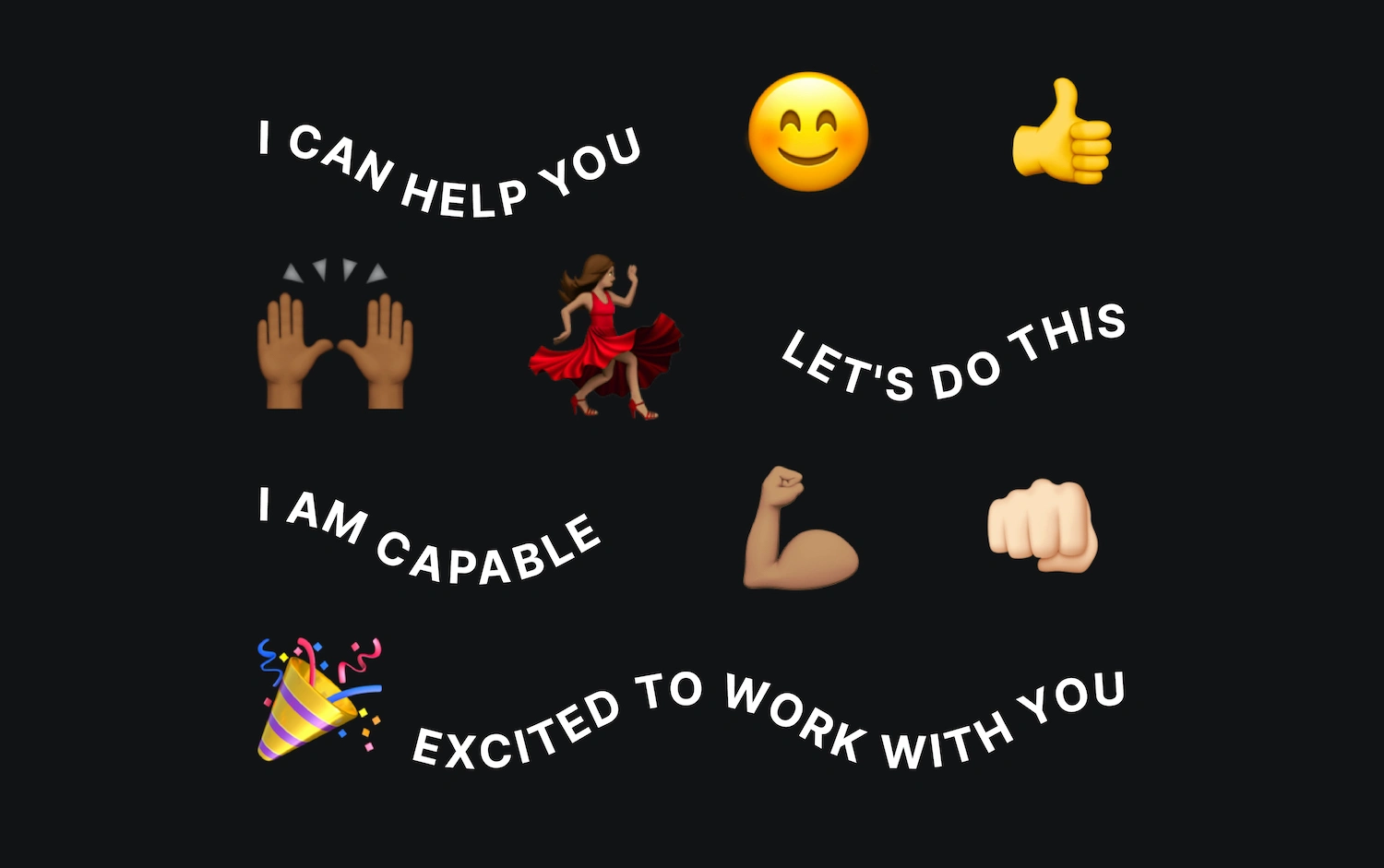
I was so scared the first time I landed a client, I was literally shaking.
But I never told a potential client I was brand new to freelance writing, and I always tried to act confident even though I was a few steps away from passing out. I knew I had writing chops, so I had enough skill to provide a valuable service to businesses.
If you want to sound confident, in your correspondence, avoid words and phrases such as:
I’m just getting started
I’m still learning
I think I can help (Don’t use think. Either you can or can’t help them, and you can!)
Give me a chance
I should be able to help
Let’s see how it goes
Be confident in your skills and what you can offer. Most times, you will be a much better writer than the person hiring you. And if you are specializing in an industry, be confident in your industry experience, which is highly valuable in freelance writing.
Don’t Talk Money Right Away
This isn’t a hard and fast rule, but I always like to talk about the projects before discussing costs. This way, the prospect knows who you are and what you can offer, so when it comes to talking about money, they will be even more compelled to give you what you ask.
Once we are ready to talk dollars and cents, I typically ask clients for their budgets first to not waste my time on a proposal if their budget is way out of my league. Even if they say they do not have a budget, EVERYONE has a set amount they are thinking of. If they decline to give you a budget, offer your going rate confidently and without explanation. There’s always a little room for negotiation, but don’t mention being negotiable unless the client brings it up.
Follow Up, Then Follow Up Again (Then Again)
You had a great conversation with a prospect and sent off your proposal. Crickets.
Don’t be afraid to follow up. Many times, prospects are so busy they forget to reply. In your first follow-up, kindly ask if they viewed the proposal and if they have any questions.
If you still do not hear back, send the second follow-up stating that your schedule is filling up, but you would love to work with this client.
The subsequent follow-up (yes, a 3rd one...stay with me now) usually gets a reply. What happens is that some prospects put the project on hold and don’t tell you if something came up, and they forget about you.
About three to four weeks after the second follow-up (if you didn’t hear back), send the message below. Five times out of 10, you will get a reply:
Hello [NAME],
I’ve not heard back from you in some time now regarding [INSERT PROJECT NAME]. I’m assuming you’ve gone in a different direction, or your priorities have changed. If I can be of any assistance in the future, don’t hesitate to get in touch.
Sincerely,
[NAME]
This message puts the ball in their court. If they haven’t gone in a different direction or their priorities have not changed, they will feel compelled to reply.
11 Freelance Writing Tools to Make Your Life Easier
Building a freelance writing career comes with its own set of challenges. To lighten your load, we thought we would provide you with some tools that increase productivity and efficiency and boost your writing ability.
Invoicing / payments / proposals:
Better Proposals (I use this software because it’s easy to use and provides analytics, but you can also use a free template in Word.)
Organization / scheduling / productivity:
Writing / editing:
Freelance writer agreements:
Freelance writing agreements protect you and the client. Start every new client project with a professional agreement so both parties are on the same page.
We discuss freelance writer agreements in detail in this article:
The Freelance Writing Life: Becoming an Independent Writer
And presto! You are a freelance writer.
OK, well, it’s not that easy. But, we hope to provide you with everything you need to get your independent writing projects started and moving along successfully.
Thankfully, everything you need to own your independent career is inside Contra. And we are so excited to share our community with you. Take a few minutes (or like 60 seconds) to create a profile so you can showcase your work and start accepting payments commission-free (cha-ching).
If you’re ready to finally work the way you want, join the future of independence and flexibility, and connect with us on Contra. We will see you there!
Like this project
Posted Apr 1, 2021
Likes
0
Views
62




